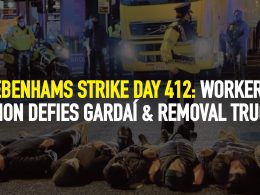Public sector workers have sent a very loud message to the Northern Ireland Assembly and the Conservative/Liberal Democrat government.
Three million workers belonging to twenty eight unions have walked out in defence of their pensions and the public services which all depend upon.In Northern Ireland it is probable that 80,000 workers have come out in a powerful demonstration of the power of the working class. The strike is a hugely important step forward in the campaign to defend our pensions and services.
The Con-Dems, Assembly and the Executive have heard a very loud message from union members. It is time that they listened. Workers do not accept the argument that wages should be squeezed, jobs should go and services should be cut to bail out the billionaires.
Further Action Required
Today’s strike is unlikely to be enough to force the Con-Dems and the Executive into retreat. To succeed a much wider campaign of industrial action, protests and publicity involving young people, private sector workers and the unemployed as well as public sector workers and their families is necessary.
This would unite the vast majority of society in the fight against cuts and for the preservation of our health service, our education service and the welfare state.
Unless the government retreats, a serious plan to escalate the action must be drawn up. A plan of action should include local and regional actions – local strikes against cuts are an essential part of the struggle. National coordinated strike action is key to forcing the government to retreat however.
It is essential that a date is set now for further general public sector strike action, of 24 hour or 48 hour duration strike, early in the new year.
Public & Private Sector: The Same Fight
The planned huge cuts to public spending will directly lead to job losses in the private sector. Further action should be spread to the private sector. Private sector workers should be mobilized behind the public sector on the next day of action – joining picket lines and demonstrations, and taking token action in large well organized workplaces.
In the past workers in Shorts, for example, have walked out to support health workers in Northern Ireland, and this possibility must now be looked at again.
To make sure that further strike action has the greatest possible effect union members must get properly organised.
Union members need to get active in their own unions, and seek to build links with other workers in their area so that there is maximum impact on strike days.
In Belfast, Dundonald and Newry rank and file activists have already taken the initiative and have held regular meetings of workplace representatives in October and November. Joint strike committees should be formed – linking members of different unions across different workplaces.
The movement must be democratic. If a fighting strategy is to be implemented it is essential that decisions on the struggle are not left solely in the hands of the national trade union leaders.
Those who are affected by the cuts must have real control over how the action progresses, how the struggle moves forward and what is agreed at the negotiations.
Don’t Let the Assembly off the Hook!
It is not enough to direct our anger, and our action, against the Con-Dem government. The Assembly parties are all implementing cuts.
The Northern Ireland Executive voted to implement a pensions levy on every civil and public servant in the pension scheme.
Today demonstrates the enormous potential industrial power of the organised working class in Northern Ireland. Without a political voice however, we are fighting with one hand tied behind our backs. We absolutely cannot rely on any of the Assembly parties, all of which are pro-cuts.
The trade unions, along with genuine community activists, anti-cuts activists and socialists, should support the formation of a new democratic mass working class party to unite thousands of workers against the cuts, offer a real alternative to the dead end of sectarianism and put forward a socialist alternative to the failed right-wing.











